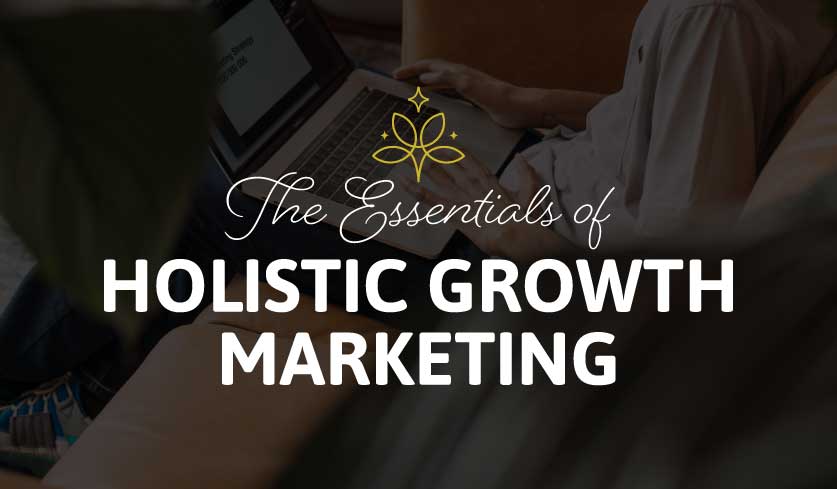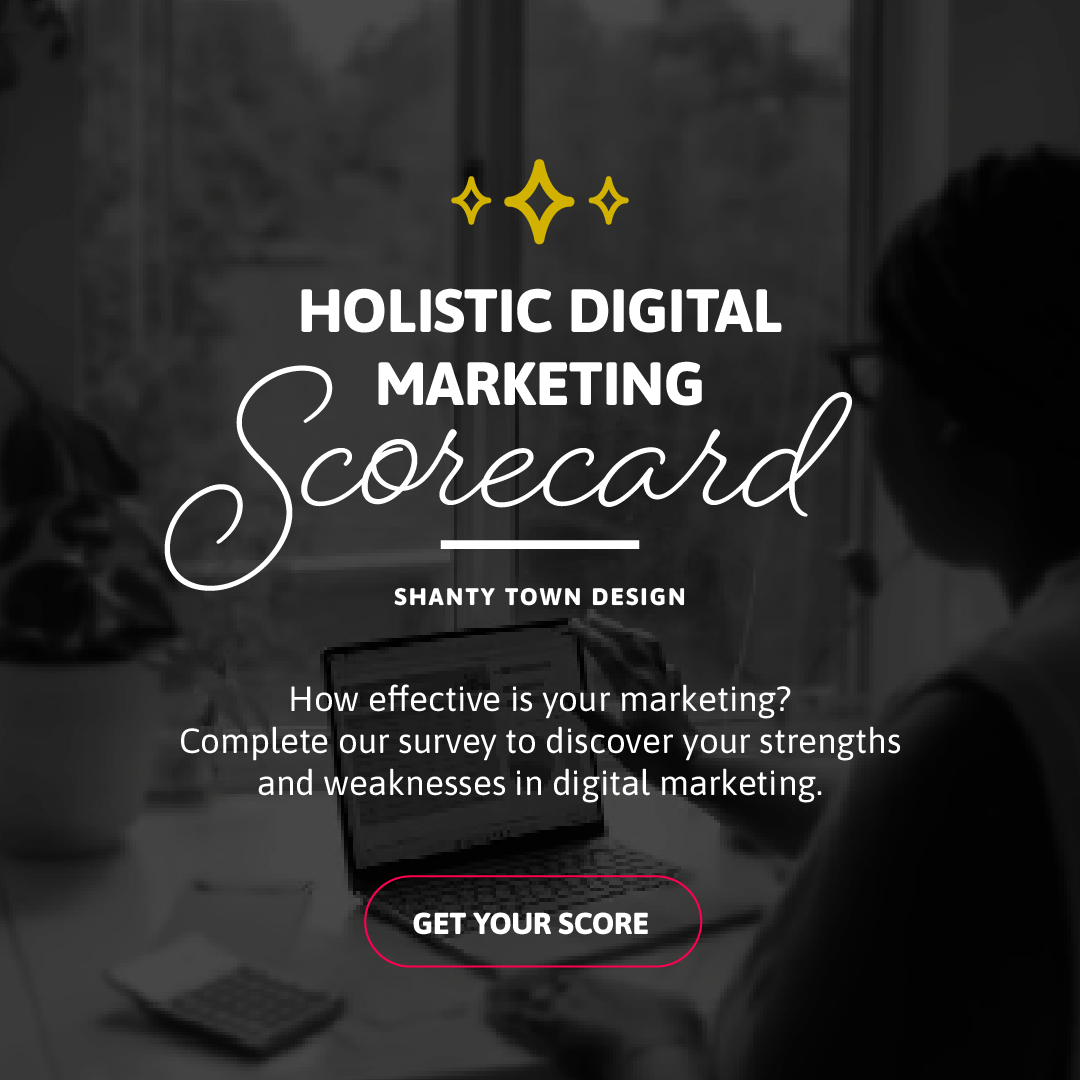What is holistic growth marketing?
In short, everything matters. Holistic marketing is a comprehensive approach that considers the entire business and all its aspects rather than focusing on individual marketing efforts or channels. This strategy is based on the understanding that all parts of marketing are interconnected and that a cohesive, unified strategy is more effective than isolated efforts.
The 4 Pillars of Holistic Growth Marketing
- Integrated Marketing: This involves ensuring that all communication and messaging forms are carefully linked. It encompasses advertising, sales promotion, public relations, direct marketing, and social media, ensuring a consistent message across all channels.
- Internal Marketing: Holistic marketing recognizes the importance of internal communication in the marketing process. This involves aligning the company’s internal environment (like employee engagement and corporate culture) with its external marketing strategies, ensuring that employees are motivated and informed brand ambassadors.
- Relationship Marketing: This aspect focuses on building long-term relationships with customers rather than just focusing on individual transactions. It involves understanding customer needs, developing communication, and creating loyalty programs to foster long-lasting customer relationships.
- Socially Responsible Marketing: This component considers the ethical, environmental, legal, and social context of marketing activities. It’s about creating a positive impact on society and the environment while achieving business objectives, including sustainable practices and corporate social responsibility initiatives.
Holistic growth marketing is effective because it creates a unified and seamless experience for the customer, aligns all aspects of the business towards a common goal, and builds a strong, sustainable brand. It’s a strategy that requires coordination and collaboration across departments but in the end, makes everyone’s focus that much clearer.
Digital Marketing in Holistic Growth Marketing
Digital marketing offers a diverse array of touchpoints for engaging with customers. Integrating these channels into a cohesive, holistic marketing strategy ensures that each channel complements the others, creating a seamless and consistent brand experience across all digital touchpoints. This integration not only maximizes the reach and impact of marketing efforts but also aligns them with the broader business objectives and customer journey, driving sustainable growth.
Your Website is the Foundation
A website often serves as the central hub or foundation of a company’s online presence. It’s where you direct traffic from various channels, such as social media, email campaigns, or search engine results. A well-designed website acts as the core where you consolidate your brand identity, provide information about your products or services, engage with customers, and generate conversions. It’s the base upon which other digital marketing efforts are built and integrated.
The 10 channels of digital marketing to consider
Digital marketing encompasses various channels, each offering unique ways to connect with audiences and achieve marketing objectives. Below is a comprehensive list of these channels:
- Search Engine Optimization (SEO): Enhancing website visibility in search engine results through organic tactics.
- Search Engine Marketing (SEM): Using paid advertising to increase a website’s visibility in search engine results, commonly through platforms like Google Ads.
- Content Marketing: Creating and distributing valuable, relevant, and consistent content to attract and retain a clearly defined audience.
- Social Media Marketing: Utilizing platforms like Facebook, Instagram, Twitter, LinkedIn, and Pinterest to engage with audiences, build communities, and advertise products or services.
- Email Marketing: Sending targeted and personalized messages to a group of people via email to promote products and services or convey important information.
- Affiliate Marketing: Partnering with individuals or companies to promote your products or services in exchange for a commission.
- Influencer Marketing: Collaborating with influential people on social media to promote products or services.
- Mobile Marketing: Reaching customers on their mobile devices through SMS, MMS, mobile apps, and responsive websites.
- Video Marketing: Using video content to promote products, services, or brand on various platforms, including YouTube, social media, or on a company website.
- Display Advertising & PPC: Placing banner, image, or text ads on websites, apps, or social media through networks like Google Display Network or by paying a fee each time an ad is clicked.
Each of these channels can be used in isolation, but they are most effective when strategically integrated into a holistic digital marketing approach, ensuring that all efforts work synergistically towards the overarching business goals.
The Role of Technology in Holistic Growth Marketing
Technology is the backbone, enabling businesses to collect, analyze, and leverage data to drive informed decision-making and personalized marketing strategies. In holistic growth marketing, technology is not just an enabler but a strategic partner that empowers businesses to create a seamless, efficient, and highly responsive marketing ecosystem that resonates with the evolving digital world.
Customer Relationship Management
A CRM enables a 360-degree view of the customer, centralizing all interactions and data points across various touchpoints into a single, accessible repository. This comprehensive perspective allows for deeper customer insights, aiding in the creation of highly personalized marketing campaigns and communication strategies. By tracking customer behaviors, preferences, and engagement history, a CRM aids in segmenting audiences more effectively, ensuring that marketing efforts are targeted and relevant.
Additionally, it streamlines collaboration across different departments, ensuring that sales, marketing, and customer service teams are aligned and informed about customer journeys and experiences. This cross-functional alignment is crucial in delivering a consistent and seamless customer experience, a key element of holistic marketing.
Moreover, CRM systems’ analytics and reporting capabilities provide valuable data that can inform strategic decisions and help measure the impact of marketing efforts, ensuring continuous improvement and adaptation to changing customer needs. In essence, a CRM is a tool for managing relationships and a strategic asset in orchestrating and optimizing holistic marketing strategies.
Marketing Automation Platforms
Marketing automation presents a plethora of innovative opportunities to enhance efficiency and effectiveness. One powerful idea is the implementation of automated email campaigns that trigger based on specific customer actions, such as welcome emails upon sign-up or follow-up messages post-purchase.
Another is the use of chatbots for instant customer service, providing quick responses to frequently asked questions and guiding users through basic queries. Social media automation tools can be employed to schedule posts and analyze engagement patterns, ensuring a consistent and optimized online presence. For e-commerce, automating inventory management and retargeting ads based on user behavior can significantly improve the shopping experience and conversion rates.
Furthermore, implementing lead scoring systems that automatically assess and prioritize leads based on their engagement levels can significantly streamline the sales process. These automation ideas not only save time and resources but also provide a more personalized and responsive interaction with customers, a key to success in today’s digital marketing world.
Analytics Tools
Analytics tools serve as the compass that guides strategic decisions and optimizations. These tools collect and analyze data from various online channels, providing insights into customer behavior, campaign performance, website traffic patterns, and more. With this data, marketers can uncover trends, measure their efforts’ effectiveness, and identify improvement areas.
For instance, website analytics can reveal which pages hold visitors’ attention the longest or where they typically drop off, enabling targeted content and design enhancements. Similarly, social media analytics provide a deep dive into engagement metrics, helping to tailor content to audience preferences, adapt strategies, and boost engagement. These tools also enable A/B testing, allowing marketers to compare different strategies and choose the most effective ones. By harnessing the power of analytics, businesses can make data-driven decisions, personalize their marketing efforts, and ultimately achieve a higher ROI. In a rapidly evolving digital landscape, the ability to quickly interpret and act on data is what sets successful marketers apart.
Emerging technologies
Emerging technologies such as artificial intelligence (AI) and machine learning are revolutionizing the landscape by offering predictive analytics and intelligent insights, allowing businesses to more precisely anticipate market trends and customer needs.
AI’s prowess in analyzing vast datasets enables it to unearth patterns and insights far beyond human analytical capacity, paving the way for highly sophisticated predictive analytics. This allows businesses to understand current market trends and customer behaviors and foresee future shifts and preferences, offering a significant competitive advantage.
Machine learning algorithms continuously improve from their interactions with data, enhancing accuracy in tasks such as personalizing customer experiences, optimizing pricing strategies, and automating customer service interactions. These technologies also empower marketers to create more targeted and effective campaigns by predicting customer responses and identifying the most promising leads.
Integrating AI and machine learning into marketing strategies signifies a monumental shift towards more intelligent, data-driven decision-making, enabling businesses to operate with unprecedented precision and foresight.
Conclusion
Holistic growth marketing emerges not just as a strategy but as a paradigm shift in how businesses approach marketing. It intertwines the foundational elements of integrated marketing, internal alignment, relationship building, and social responsibility with the dynamic capabilities of digital marketing channels.
The central role of a well-structured website, alongside diverse and potent channels like SEO, SEM, content, and social media marketing, underscores the importance of an interconnected and synchronized approach. The incorporation of cutting-edge technology, from the indispensable insights provided by CRM systems to the efficiency and personalization offered by marketing automation platforms, demonstrates the critical role of technology in enhancing customer experiences and driving business growth. Analytics tools are the guiding light in this journey, offering data-driven insights that shape and refine marketing strategies. Moreover, the advent of AI and machine learning heralds a new age of predictive analytics and intelligent customer engagement, marking a significant leap towards future-forward, data-driven decision-making.
In essence, holistic growth marketing is a comprehensive and dynamic approach tailored to meet the evolving demands of the digital age, fostering sustainable growth and building enduring customer relationships. It’s an approach that not only aligns with the current marketing landscape but also anticipates and prepares for the challenges and opportunities of the future.










